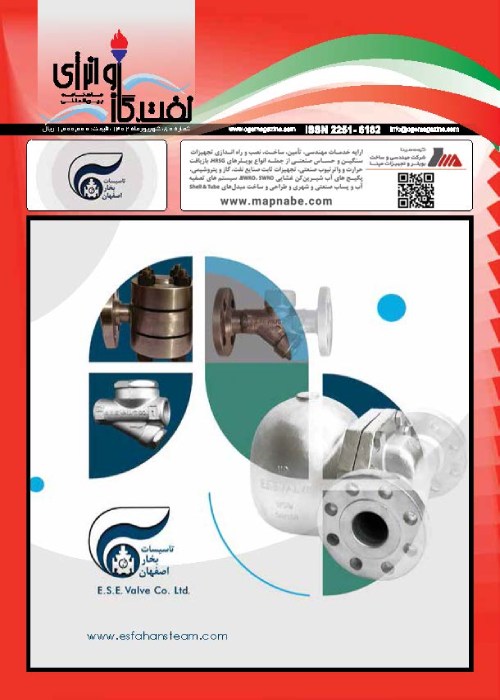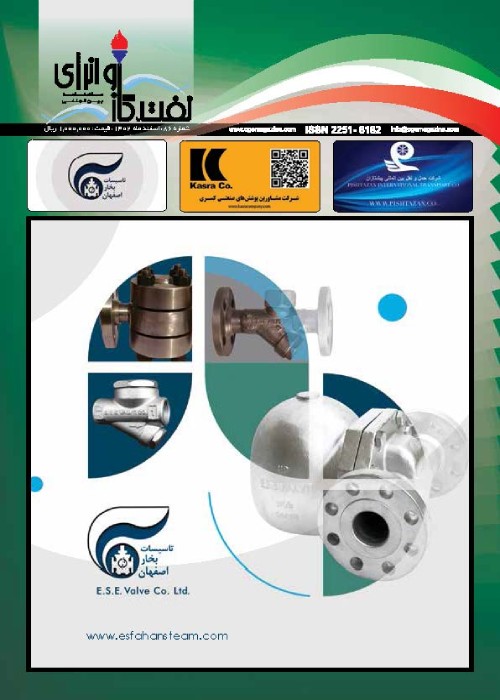فهرست مطالب

ماهنامه نفت، گاز و انرژی
شماره 80 (شهریور 1402)
- تاریخ انتشار: 1402/06/30
- تعداد عناوین: 6
- خبر
-
Pages 14-19
The global consumption of natural gas is increasing rapidly due to the increasing demand for clean and environmentally friendly energy. Therefore, LNG trade is increasingly developing due to the need for clean and cheap fuel in the las t three decades. Currently, natural gas is used as the third energy source in the world. The reference of mos t of the forecas ts of reliable centers shows that natural gas will have the highes t demand growth among other primary energy sources until 2040, after renewable energies, as a clean and cheap fuel. This paper, Provides a review of the advances, innovation and new ideas in the LNG production and transportation and reduce operating cos ts.
Keywords: Natural Gas, LNG, Production, Transportation -
Pages 21-35
Energy sys tems, despite their important components and diversity, energy sys tems have subs tantial implications for health, ecosys tems, and natural resources; accordingly, over 1,000 LCA (Life Cycle Assessment) s tudies on energy sys tems have been done throughout the las t two decades to assess and minimize these impacts. This article evaluates the applications of LCAs in energy and heat generation energy sys tems to identify environmentally sensitive points, as well as providing brief and important information about 1) methodology, including defining the objectives and scope of s tudies, covering the sys tem life cycle and environmental impacts; and 2) The results obtained from these inves tigations, particularly those aimed at identifying environmental hotspots and patterns of influence in various energy sources, are given. Provisional insights on LCA s tudies for energy sys tems are also required since many policymakers now specify energy paths for the next decades and demand predicted evaluations of the consequences of technology. Calculate the present and future. This s tudy seeks to evaluate LCA recommendations and guidelines on major parts of methodology in order to appropriately guide LCA research on energy sys tem policy.
Keywords: Life Cycle Assessment (LCA), Energy Supply Sys tems, Technologies, Renewable Energy, Power Plants, Greenhouse Gas (GHG) Emissions -
Pages 1-9
The chemical method of demulsification using a demulsifier is one of the mos t widely used methods to remove these emulsions. In this article, we are dealing with the laboratory inves tigations in one of Iran’s oil reservoir, the effective factors for removing the emulsion with the demolition fire chemical. The results of the laboratory show that the mos t important factor to increase the efficiency of the demolisher is the time required to mix this chemical with oil. In the initial times of 5 and 10 minutes, the results showed that the atmosphere was not activated and no water was separated from the oil, and the emulsion s till remained, with the passage of time, after 20 minutes, some water was separated from the oil and the emulsion decreased. In order to use Demolition Fire, a special laboratory tes t mus t be done, which was achieved in a timely manner. The second case is that the results show that no water is separated from the oil at concentrations of 10, 20, 30 PPM, but at 40, 50 PPM, water is separated from the oil, so the optimal injection rate of the demulsifier for the respective tank should be obtained.
Keywords: Laboratory Tes t, Water-in-oil emulsion, Emulsion Performance, Reservoir oil


